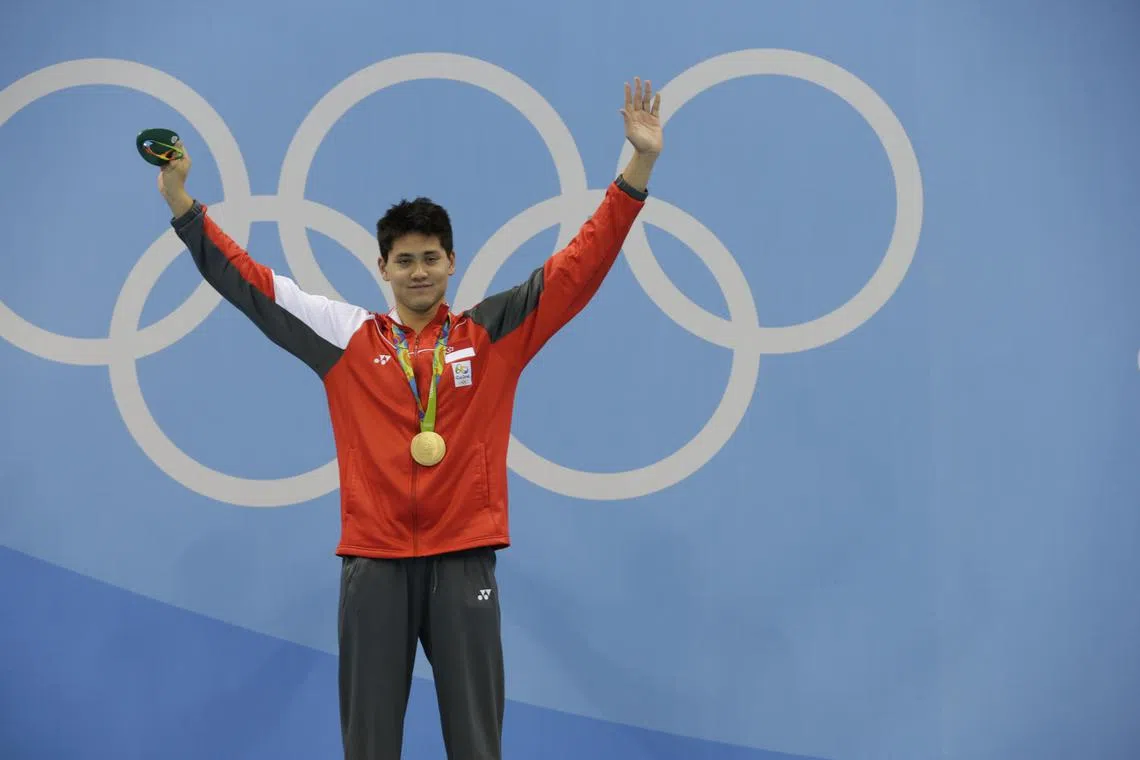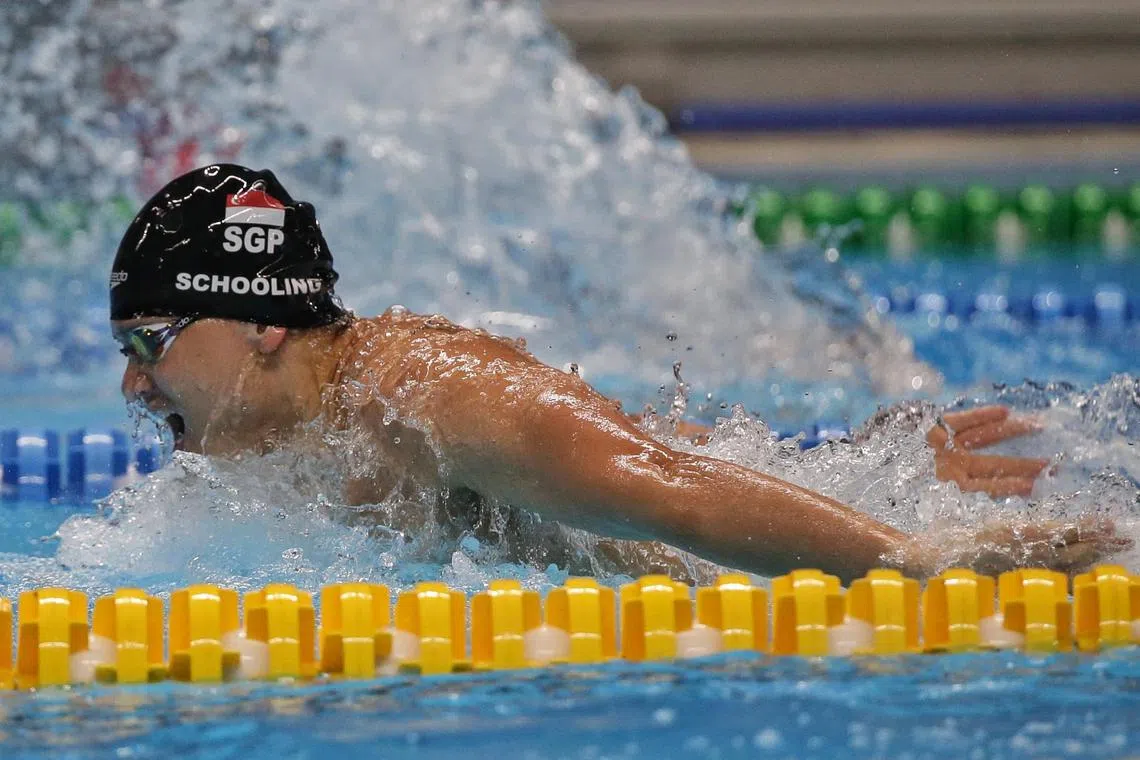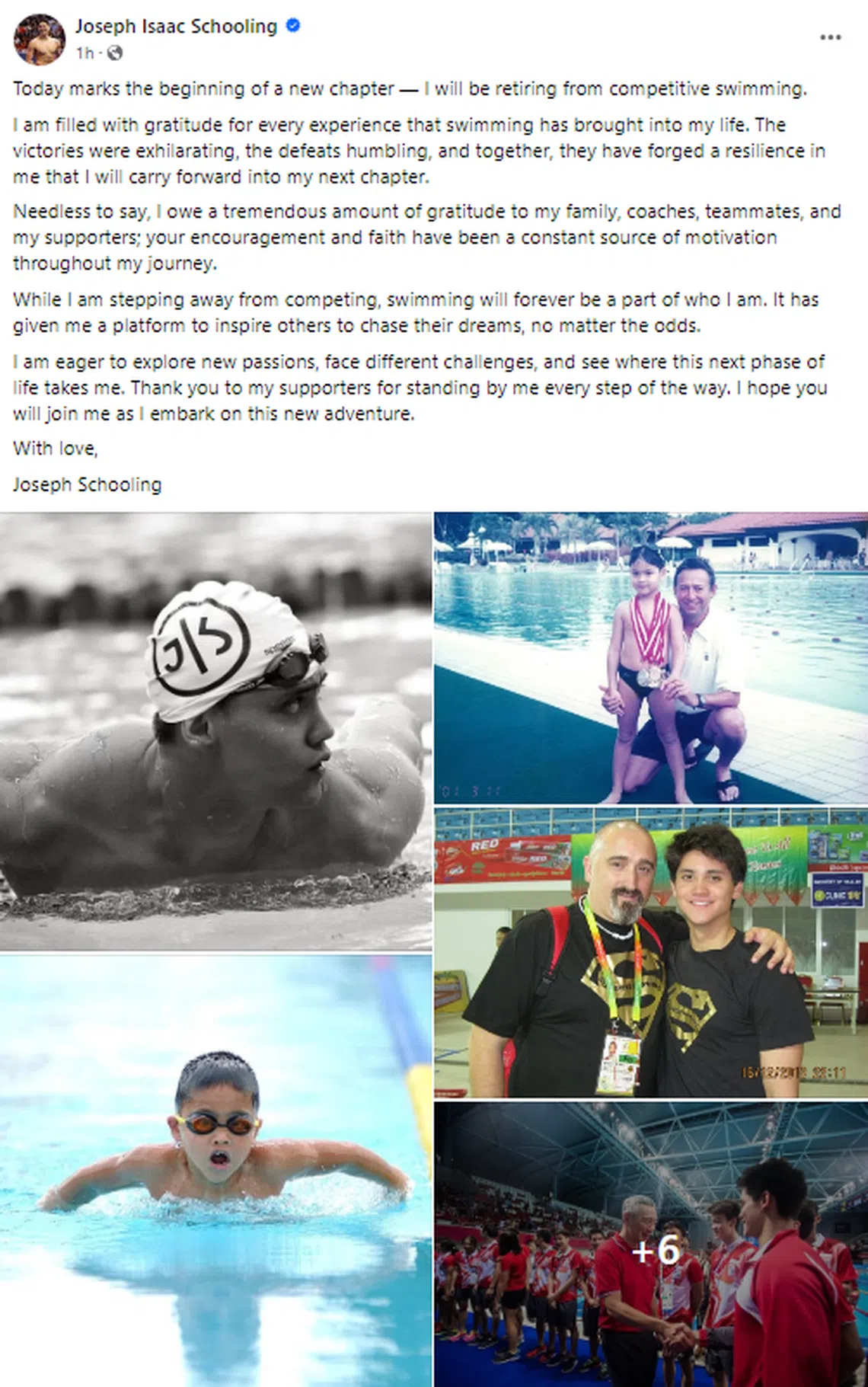‘My mistake was the complacency to think that this will last forever,’ says Joseph Schooling
In an exclusive retirement interview, Joseph Schooling talks to Rohit Brijnath about the highs and lows of his career
Sign up now: Get the biggest sports news in your inbox
The photograph in The New York Times was evocative. Water flying and an athlete screaming. The flag on the swimmer’s cap was of Singapore. The headline read “Somebody (His Name’s Joseph Schooling) Finally Beats Michael Phelps”.
It was Aug 12, 2016.
Before the Olympic 100m butterfly final,
That was Joseph Schooling’s brilliant time. Now it has run out.
Of that night in Rio, Schooling says, it felt like “they were playing in my sandbox”. That sandbox is now forever shut. The swimmer who authored the greatest career in Singapore sport has retired at 28.
“If you dedicated your whole life to something,” he says, “stepping into another phase is both scary and exciting.”
Before his announcement, Schooling sat down with The Straits Times for an exclusive, 84-minute conversation on a remarkable life. This is a swimmer who was acutely ambitious, volatile at practice – “if one person doesn’t hold the same sort of mindset (to be the best), don’t be there” – won medals at every level (Olympic, world, Asian, Commonwealth), consumed cannabis overseas
Nothing was off the record. Not whether champions should hold themselves to a higher standard. Yes, he said. Not even the confusing years after he won Olympic gold,
What happened?
“Complacency,” he bluntly says.
“My mistake was the complacency to think that this will last forever because I’m so far ahead. Add on ego, add on pride. Add on that, ‘I’m never going to be shut-down attitude’. That’s a recipe for complacency. That’s one of the lessons that I learnt.”
Love of water
But this story begins with a toddler who used to run instinctively towards water. At four he was beating older kids, so “Uncle Vincent (Poon, his first coach) had those bigger kids put on fins. He had them swim half-a-lap ahead of me, held me back at the wall and asked me to chase them.
“I got so mad.”
He also got fast.
So fast that in a nation tuned to academia, a family bravely decided to invest in a child’s sporting talent. Colin and May Schooling sent Joseph to The Bolles School in Florida. He was 14, far away, but a testing environment polished his inner beast.
“I came in losing to all the seniors, kids five years ahead of me. Losing and losing and losing. And I just saw myself getting closer and closer and closer. And once I sunk my teeth in there, I wasn’t gonna let go.” He was chasing the best in the world and it often means one thing. “You’re going to be the best.”
With bodies half-submerged, so much of swimming is invisible. What made Schooling – height 1.84m, wingspan 1.93m – great was drive and feel.
“Feel,” he explains, “is the ability to close my eyes and know exactly how my body is positioned in the water. When I start pressing, and start catching that water with my fingers, I don’t need to open my eyes. I know where my body is and how and why my body is moving the way it is.”
A hard education
Greatness requires sweat, wisdom and tough lessons. Before the 200m butterfly at the 2012 Olympics, Schooling was told his goggles and cap were not approved and so he couldn’t use them. He was 17 and rattled but a vital lesson was learnt.
“Anything can happen. Be ready for everything.”
In the US, Schooling grew up. Ferocious in his appetite to win and full of “teenage angst”, he tested his mentor, coach Sergio Lopez. “He had to absorb all this nonsense I threw at him, tantrums, being late to practice.”
After the 2012 goggles incident, Schooling had “a huge falling-out” with Lopez. It was just a teenager acting out. “I was just throwing everything negative I felt at him.” Until Lopez’s wife, Sandy, told Schooling that Lopez didn’t want to coach him any more. “That’s when I woke up. Like, whoa, I didn’t think it was that serious”.
It was a lesson about respect and Schooling responded beautifully. At the 2016 Olympics, even though he was coached then by Eddie Reese, at the University of Texas, he did something unusual.
“I grabbed Serge (then head coach of Singapore) and I said, we have this tradition. I want you to walk me to the ready room and he was shocked.” It was a pupil saying thank you to his guru.
Lopez and his coaches were vital, for they offered him more than practice sets. “A good coach,” he explains, “gives you that unwavering feeling that he’s going to run through a wall with you. Like, you’re going to war essentially.”

In the US, Joseph Schooling grew up. Ferocious in his appetite to win and full of “teenage angst”, he tested his mentor, coach Sergio Lopez.
ST PHOTO: KEVIN LIM
Hero of Rio
In August 2016 almost no one in Singapore knew how good Schooling had become. Him versus Michael Phelps felt like an unequal battle. But we could not see his belief and his courage.
And we didn’t know that in his second year at college, to his own bewilderment, Reese whispered in his ear: “Jo, I don’t think you know how good you are. But I think it’s good that you don’t know how good you are”.
In the 100m freestyle, Schooling made the semis and emerged thinking, “Wow, that really hurt. I don’t know how this fly is gonna go”. But in the 100m butterfly heats he was another swimmer.
“Michael is next to me. And I felt like that was one of the easiest races I’d ever swum. Not even tired at all. Almost to the point where I could dictate what I wanted to do, but not only that, what everyone else does.”
Schooling’s 51.41 seconds was fastest in the heats. His 50.83 was fastest in the semis. “I’m thinking to myself, is this actually happening... I’m starting to realise that this is my race to lose tomorrow.”
He led the final at 50m and with 35m left he knew it was his. He finished first,

Joseph Schooling won gold in the men’s 100m butterfly at the Rio 2016 Olympic Games.
PHOTO: ST FILE
Fame and the aftermath
No Singaporean had been where he was and so no Singaporean knew what it felt like. In 50.39 seconds Schooling had become a national icon and out of water he had to learn to keep his balance.
“(It was) overwhelming, for sure.”
He was lucky he had fine people around him for whom he was always just Jo. But still, fame is a foreign land and he had no guide. “I had to figure out a lot of things by myself.”
Schooling was still achieving things no Singaporean had – bronze at the 2017 world championships, two golds at the 2018 Asian Games – but he wasn’t as fast as he was. “Overconfident,” he flatly says of himself then. “Entitled, actually, would be the direct way to put it. I felt like I didn’t need to work as hard any more because I got to that level.”
His dad, Colin, wrote worried e-mails in all caps to Reese and, as Schooling says, “Eddie would just call him and say, ‘Colin, look, Jo’s sole mission on this planet was to win an Olympic gold medal’. And he emphasised ‘an’ Olympic medal. One... ‘(So) can you actually blame the kid for letting off some steam or taking his foot off the gas pedal after he’s accomplished his lifelong dream at 21’?”

Joseph Schooling in the men’s 4x100m medley relay final at the 18th Asian Games in the Gelora Bung Karno Aquatic Centre, Jakarta, on Aug 24, 2018.
PHOTO: ST FILE
And really that was it.
“Deep down,” says Schooling, “I accomplished what I wanted to.”
Maybe also Schooling never gave himself a break. He’d woken, swum, lifted, eaten, breathed, fought all his life with a single purpose. Olympic gold. Now he had it, now what? In hindsight, he says, “I was just sick and tired of it. I had almost two decades of non-stop (swimming) without giving my mind a rest.”
At one point after the Olympics, out of shape, anxious, facing Caeleb Dressel in the NCAA championships, he even called Phelps. “I was like, how do you deal with all the scrutiny? It almost makes you fall out of love with swimming.”
Phelps asked him, “Who do you swim for?” Schooling replied, “For myself, my parents and the people around me.” Exactly, replied Phelps. The point was the noisy critics in the stands, they didn’t matter. Neither did they have what Schooling owned, a piece of gold-plated metal on a ribbon which rested in a safe in his parents’ office.
Cannabis and conclusion
The finest of champions trip. Phelps was caught drink driving. Serena Williams abused a lineswoman. Schooling had inspired schoolchildren, put aside meals to sign autographs, shared himself with the media, but then in 2022, a year after he finished 44th in his Olympic defence with a slow time of 53.12, he confessed to consuming cannabis overseas.
It was, he says, “embarrassing and humiliating”.
Years ago in a provocative Nike ad, the basketballer Charles Barkley growled: “Just because I dunk a basketball doesn’t mean I should raise your kids.” It’s an interesting argument on role models, but Schooling doesn’t duck responsibility.
“The way I want to look at it is, OK, you know what, this person actually looks up to athletes, looks up to me. And I should hold myself to higher standards as well.
“Is that tiring? Is that tough? Yeah, sometimes. Does it make me miserable? No... Make the best use of this platform and leave that legacy that you want to leave.”
We’re going to be more thankful to Schooling than we understand. For the great steps, the missteps and for opening up arguments again, as with national service.
“Defence is No. 1,” he says. “The next question is, can these two things coincide? Absolutely. I think it’s going to take a lot of work.”
He still swims, the water not his challenge any more but his refuge. The golf course pulls him, too, and so will work. “I am going into the VC (venture capital) space with two partners. We’re going to slice that up into three pillars: health and wellness, tech, and sustainability.”
But of course his legacy has to be connected to water and it’s his swim school. Not just teaching kids to be safe but knowing that confidence found in the water “will trickle down into every aspect of your life”.
The interview is winding down and later, outside this room at the Chinese Swimming Club, he’ll charm a middle-aged lady. A photo with Jo? Really? She beams. He smiles. All afternoon he’s talked, moving from forthright to vulnerable, and there’s time for one last question.
What has swimming given him?
“It’s given me the world, man.”




